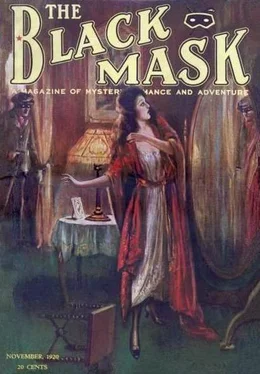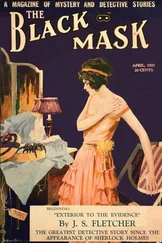Hamilton Craigie - The Black Mask Magazine (Vol. 2, No. 2 — November 1920)
Здесь есть возможность читать онлайн «Hamilton Craigie - The Black Mask Magazine (Vol. 2, No. 2 — November 1920)» весь текст электронной книги совершенно бесплатно (целиком полную версию без сокращений). В некоторых случаях можно слушать аудио, скачать через торрент в формате fb2 и присутствует краткое содержание. Город: New York, Год выпуска: 1920, Издательство: Pro-distributors Publishing Company, Жанр: Классический детектив, на английском языке. Описание произведения, (предисловие) а так же отзывы посетителей доступны на портале библиотеки ЛибКат.
- Название:The Black Mask Magazine (Vol. 2, No. 2 — November 1920)
- Автор:
- Издательство:Pro-distributors Publishing Company
- Жанр:
- Год:1920
- Город:New York
- ISBN:нет данных
- Рейтинг книги:5 / 5. Голосов: 1
-
Избранное:Добавить в избранное
- Отзывы:
-
Ваша оценка:
- 100
- 1
- 2
- 3
- 4
- 5
The Black Mask Magazine (Vol. 2, No. 2 — November 1920): краткое содержание, описание и аннотация
Предлагаем к чтению аннотацию, описание, краткое содержание или предисловие (зависит от того, что написал сам автор книги «The Black Mask Magazine (Vol. 2, No. 2 — November 1920)»). Если вы не нашли необходимую информацию о книге — напишите в комментариях, мы постараемся отыскать её.
The Black Mask Magazine (Vol. 2, No. 2 — November 1920) — читать онлайн бесплатно полную книгу (весь текст) целиком
Ниже представлен текст книги, разбитый по страницам. Система сохранения места последней прочитанной страницы, позволяет с удобством читать онлайн бесплатно книгу «The Black Mask Magazine (Vol. 2, No. 2 — November 1920)», без необходимости каждый раз заново искать на чём Вы остановились. Поставьте закладку, и сможете в любой момент перейти на страницу, на которой закончили чтение.
Интервал:
Закладка:
“About nine, I should judge.”
“And how long do you think it would take her to return home from that spot, provided she went directly by trolley?”
“No more than fifteen minutes.”
“Then she could have been home at nine-fifteen?”
“Easily.”
“You’ve considered, I suppose, that the stabbing occurred at nine-twenty? ”
Fleming avoided the detective’s gaze. He felt that by defending the girl he was putting himself in an awkward position, yet in his heart he knew he would go on defending her to the end. And the end? What would it be? Finally, seeking an argument on which to pin his dwindling hope, he asked: “How can you be so sure of your time?”
“Easily. There’s a small grocery store on the corner, and in its window hangs a. clock which Officer Haggerty is in the habit of consulting as he swings around his beat. It was exactly nine-twenty by that clock when, as he passed the Window, he heard De Brunner’s cry. Lola, it would appear, had been home five minutes.”
Knibbs winced; then suddenly struck by an idea he leaped to his feet. “But if she returned directly home after leaving me, the stolen property must have been in her possession,” he cried. “And as it wasn’t in her possession, she couldn’t have returned directly home, and must have arrived after the deed was done. That clears her of all suspicion.”
He sat down in an exultant glow.
Dreer lay back in his chair and laughed heartily. His green glasses flashed in the morning sunlight pouring through the open window.
“The profession lost a genius when you took to clipping coupons for a life work,” he chuckled. “My boy, consider these facts: all ‘fences’ do not live miles away from their co-workers. They may even live conveniently near. In which event the girl could have dropped in without losing more than a minute or two. Besides, it would be foolish for either of us to try to prove her absence at the time of the tragedy, for in addition to her father, averring her presence, Haggerty found her in the room when he entered. My chief reason for questioning you concerning the hour of the hold-up was to establish a limited area in which her ‘fence’ might be located. For I believe she employed a ‘fence.’ He may, really, be more guilty than she. And if we find him it may lead to a clearing of the whole mystery. I am beginning to sense a link between the robbery and the stabbing; and I’m glad, after all, that you didn’t allow me to arrest her last night. Now she can be watched. You know, young Knibbs, the musty old saying: murder will out. ”
Fleming was decidedly pale.
“I think you do her an injustice,” he muttered.
“That’s just what I’m trying not to do. If she isn’t guilty of wrongdoing she deserves to be cleared in our sight. And if she is—”
He left the rest to be inferred, and on the whole it carried a sinister meaning with the shadow of the dreaded “chair” looming in the background.
IV
Knibbs left his friend Dreer’s apartment in a depressed frame of mind. He felt that if his half-asleep girl proved as black as circumstances had painted her he could no longer entertain faith in humankind. Also, in this indigo mood, he nursed a slight resentfulness toward Dreer for casting additional suspicion upon her, and reflecting deprecatingly upon his deductive ability.
He would show the old fellow. This affair wasn’t over yet. The truth was still hidden from them. Thus steeped in his musings, and not fully realizing what he was doing, he signaled a passing taxi.
Within, he sat chewing the cud of his thoughts as the constricted city landscape flashed by. Twenty minutes passed. At length he felt the machine stop, and heard the chauffeur’s voice, “Here you are, sir.”
He looked up. The taxi was standing before the little grocery store which Dreer had described. Then Fleming Knibbs remembered that, with some vague idea of accumulating additional facts, he had ordered to be driven into Lola’s neighborhood.
He paid the man and stood idly watching him drive away. He didn’t quite know what to do, where to begin. Uncertain as he was; he started to walk around the block, hoping a course would suggest itself. He passed the shabby De Brunner residence slowly. There was crepe on the door, and the worn green shades in the front room were drawn to a level with the slightly opened windows. At the next corner he swung to the right. Shortly he came to an alley lined with drunken fences and battered slop cans. On the impulse he entered it. He knew he would find the De Brunner backyard somewhere along-here. As to what he would do when he reached it he hadn’t the faintest idea.
There were two stout Women in faded gingham house dresses and aprons standing at a gate directly behind De Brunner’s. As Knibbs neared them he caught snatches of their conversation. They were talking of the tragedy.
Fleming took his nerve in hand.
“Pardon, ladies,” he interrupted. “I understand there was a suicide in the neighborhood—”
“You’re right there was,” responded the more garrulous of the pair, apparently glad for the opportunity to air what she knew. “In that house there — right in front of you. They just moved in the other day, an’ now one of ’em’s gone a-ready. Stabbed hisself. I heard the paralytic yell when he did it. An’ then two men came runnin’ out the back gate. ‘Somethin’s wrong,’ I told meself; an’ sure enough I was right. They was goin’ for the doctor, I guess, an’—”
“Well, well—too bad,” commented the young man, restraining his excitement with difficulty as the last fact made itself known. “Did they return quickly?”
“I dunno. But they’re back now. I saw ’em in the yard this mornin’.”
“Too bad,” repeated Knibbs, simulating the idle sympathy of the curiosity seeker. “However, such things are happening continually, aren’t they?”
And nodding and tipping his hat he moved on, picking his way between cans until he again reached the end of the alley. But he looked cautiously back within a few minutes, and, finding the women £one, retraced his steps.
At the De Brunner gate he found, luckily, no bolts to hinder his progress, and entered quickly. All he wanted was a surreptitious look at the two men who had projected themselves into the drama, so that, should the occasion arise, he might identify them. He walked softly to the kitchen window and peered within. The room was empty.
Then, suddenly, he felt his ankles seized, and he fell, and was jerked through a narrow window into the dark, evil-smelling cellar. And before his senses had regained their equilibrium, his arms were trussed behind him with a strip of clothes-line.
He heard a coarse laugh. “Well, fella, that time yuh got fresh once too often, didn’t yuh?”
At this moment the cellar door opened and a voice muttered:
“What’s wrong down there, Belden? Why the racket?”
“Caught a snooper, Jim,” retorted Fleming’s assailant, triumphantly.
“No!”
“Uh-huh.”
“Bring him up.”
Knibbs’s arm was seized in a rough grasp and he was thrust through the darkness. With the other man behind him, prodding, he marched up the stairs into the kitchen.
Now he could see the two men clearly. His captor was a short, stocky fellow with a bull neck, pugnacious jaw, and close-cropped red hair. A typical prize fighter. The other—a tall, lean chap—affected a little mustache above a pair of hard lips, and a stock around his neck.
The lean one faced him. “What’s the big idea?” he demanded. “Come on, now—talk. What business have you here?”
This was another poser for Knibbs. He knew he had exceeded his rights by prowling around the place. Of course, he was doing it for the girl’s sake, but he couldn’t tell them that. What could he tell them?
Читать дальшеИнтервал:
Закладка:
Похожие книги на «The Black Mask Magazine (Vol. 2, No. 2 — November 1920)»
Представляем Вашему вниманию похожие книги на «The Black Mask Magazine (Vol. 2, No. 2 — November 1920)» списком для выбора. Мы отобрали схожую по названию и смыслу литературу в надежде предоставить читателям больше вариантов отыскать новые, интересные, ещё непрочитанные произведения.
Обсуждение, отзывы о книге «The Black Mask Magazine (Vol. 2, No. 2 — November 1920)» и просто собственные мнения читателей. Оставьте ваши комментарии, напишите, что Вы думаете о произведении, его смысле или главных героях. Укажите что конкретно понравилось, а что нет, и почему Вы так считаете.












